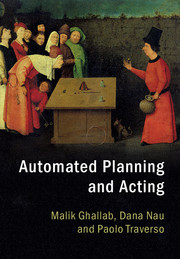Book contents
- Frontmatter
- Dedication
- Contents
- List of Algorithms
- Table of Notation
- Foreword
- Preface
- 1 Introduction
- 2 Deliberation with Deterministic Models
- 3 Deliberation with Refinement Methods
- 4 Deliberation with Temporal Models
- 5 Deliberation with Nondeterministic Models
- 6 Deliberation with Probabilistic Models
- 7 Other Deliberation Functions
- 8 Concluding Remarks
- Appendix A Search Algorithms
- Appendix B Strongly Connected Components of a Graph
- Bibliography
- Index
5 - Deliberation with Nondeterministic Models
Published online by Cambridge University Press: 05 August 2016
- Frontmatter
- Dedication
- Contents
- List of Algorithms
- Table of Notation
- Foreword
- Preface
- 1 Introduction
- 2 Deliberation with Deterministic Models
- 3 Deliberation with Refinement Methods
- 4 Deliberation with Temporal Models
- 5 Deliberation with Nondeterministic Models
- 6 Deliberation with Probabilistic Models
- 7 Other Deliberation Functions
- 8 Concluding Remarks
- Appendix A Search Algorithms
- Appendix B Strongly Connected Components of a Graph
- Bibliography
- Index
Summary
In this chapter we drop the unrealistic assumption of determinism, that is, the assumption that each action performed in one state leads deterministically to one state. This apparently simple extension introduces uncertainty in the model of the domain and requires new approaches to planning and acting. Deliberation must take into account that actions can lead to a set of states; plans are no longer sequences of actions, but conditional plans; solutions may have different strengths. Deliberative acting with nondeterministic models allows us to take into account uncertainty when actions are performed.
The main motivations for planning and acting with nondeterministic models are in Section 5.1. The planning problem is formalized in Section 5.2. In the subsequent three sections we present some different approaches to planning with nondeterministic models: And/Or graph search (Section 5.3), symbolic model checking (Section 5.4), and determinization techniques (Section 5.5). In Section 5.6,we present techniques that interleave planning and acting. In Section 5.7, we present planning techniques with refinement methods and nondeterministic models, and in Section 5.8 we show techniques for deliberative acting with input/output automata. Comparisons among different approaches and main references are given in the discussion and historical remarks in Section 5.9. The chapter ends with a few exercises.
INTRODUCTION AND MOTIVATION
Recall that in deterministic models, the prediction of the effects of an action is deterministic: only one state is predicted as the result of performing an action in a state (seeChapter 2, Section 2.1.1, assumption in item 3). Nondeterministic models predict alternative options: an action when applied in a state may result in one among several possible states. Formally, γ (s, a) returns a set of states rather than a single state. The extension allowed by nondeterministic models is important because it allows for modeling the uncertainty of the real world.
In some cases, using a deterministic or a nondeterministic model is a design choice. For instance, in the real world, the execution of an action may either succeed or fail. Despite this, in many cases, it still makes sense to model just the so-called nominal case (in which failure does not occur), monitor execution, detect failure when it occurs, and recover, for example, by replanning or by re-acting with some failure-recovery mechanism. In these cases, deterministic models can still be a convenient choice.
Information
- Type
- Chapter
- Information
- Automated Planning and Acting , pp. 155 - 216Publisher: Cambridge University PressPrint publication year: 2016
